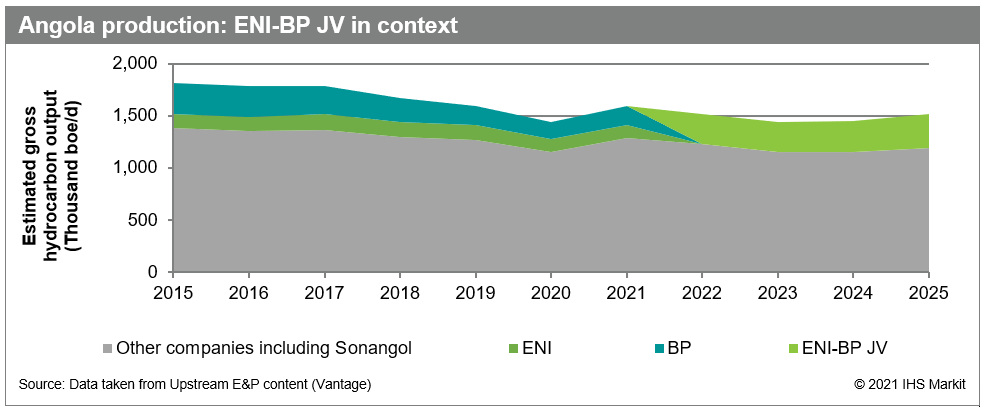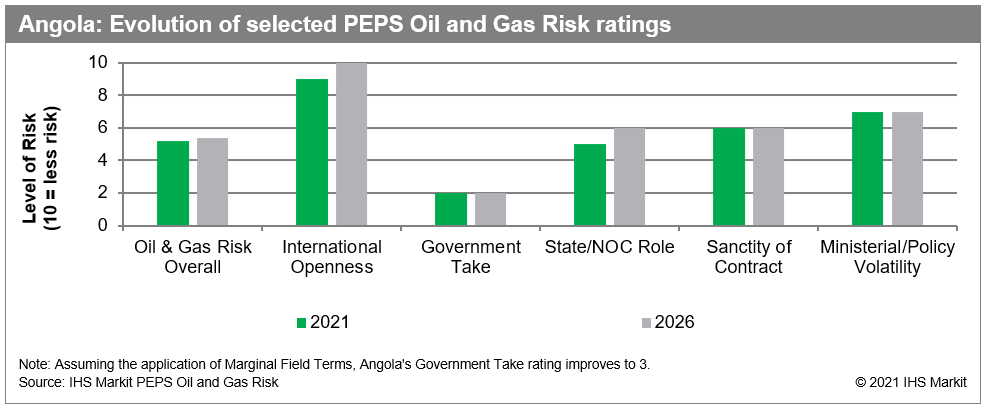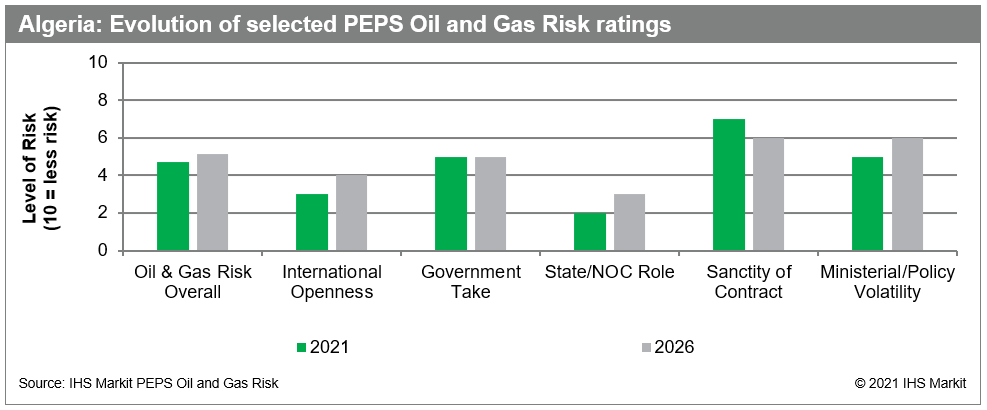Customer Logins
Obtain the data you need to make the most informed decisions by accessing our extensive portfolio of information, analytics, and expertise. Sign in to the product or service center of your choice.
Customer Logins
BLOG
Jul 19, 2021
Eni and BP’s African joint ventures: A new IOC upstream approach for energy transition?
Eni and BP are examining possible upstream joint ventures in Angola and Algeria. The proposed JVs highlight efforts by international oil companies (IOCs) to adjust their asset portfolios to redress weakened financial returns and pursue new low-carbon strategic directives. The ventures also signal an accelerating shift in the upstream competitive landscapes of maturing African producers, as key players make more selective investments.
Angolan JV offers scale, synergies, and flexibility in a
maturing asset base
The proposed Angolan JV includes all of Eni and BP's oil, gas, and
liquefied natural gas (LNG) assets in the country, which would
enable the two European majors to derive operating efficiencies and
synergies from merging exploration and development assets. The
arrangement would also create a more material portfolio ripe for
future full or partial farm-down.
The new JV is expected to hold approximately a quarter of Angola's hydrocarbon production, with more than 3 billion barrels of oil equivalent (boe) of undeveloped resources weighted towards oil. Angola's 2018 marginal field terms should facilitate new developments, with approximately 0.4 billion boe of the JV's undeveloped resources already qualifying for the improved terms. Angola's 2018 Natural Gas Framework Law will also assist the JV's focus on new gas developments to feed the Angola LNG plant, in which both firms hold an equity stake.

Note: Historical and projected production volumes represent
estimated gross production volumes as per current company working
interest in IHS Markit Vantage.
Algerian discussions seek similar synergies to
Angola
In Algeria, potential co-operation between the companies has yet to
take a clear shape. Current discussions reportedly include the
possibility of BP divesting its Algerian assets to Eni, forming a
JV along the lines of the proposed Angolan venture, or swapping
them for stakes in other Eni assets, potentially in countries
including Egypt and Mozambique.
BP's portfolio in Algeria includes stakes in the In Salah and In Amenas gas and condensate projects. The acquisition of these assets would further consolidate Eni's position in Algeria as well as the North Africa and Middle East region, which is already Eni's single largest producing area (accounting for about 37% of global production for 2020). The Algerian JV could pave the way for cost reductions and additional low-cost, short-cycle exploration and development opportunities.
Governments likely to back sustained investment - with
some caveats
The JVs are significant on a regional and country level, given
Eni's role (and to a lesser extent, BP's) as a key investor across
Africa. For the host governments, the JVs are probably a preferable
outcome to a wholesale company exit, but there are caveats. In
Angola, the authorities may not welcome further consolidation of
the limited deepwater competitor mix, although the Eni-BP venture
will probably unlock investment in both infrastructure-led
developments and new play-opening exploration that may not have
otherwise been realised.

In Algeria, meanwhile, the government is likely to be disappointed
to lose a high-profile, well-capitalised investor like BP, but it
has been eager to bolster its appeal to Eni, one of a number of
companies that have signed memoranda of understanding (MOUs) for
new opportunities. However, the government has hindered past
M&A activity - for example by blocking Occidental's sale to
Total - and could yet complicate any future divestment process
unless it can be convinced of the upsides.

JVs could become an appealing strategic lever as energy
transition unfolds
Both Eni and BP's revised transition-focused strategies envision
diminished oil and gas production, but upstream cash flow will
continue to be essential to expand low-carbon businesses and meet
shareholder distribution commitments.
In that context, the proposed JVs appear to be a strategic tool for Eni and BP to drive upstream efficiencies in maturing areas, and Eni is said to be considering new JVs with other companies in the UK North Sea and the Middle East. Combinations of established asset portfolios may become more common as the energy transition plays out, offering IOCs flexibility in how they manage a gradual reduction in upstream investment and how they account for the emissions and financial liabilities associated with those assets.
Governments need to be flexible on terms as upstream
evolves
Although host governments in Africa may welcome any strategy that
sustains investment and monetises resources, JVs could potentially
add a further disruptive dynamic and complexity to the continent's
upstream competitive landscapes. The shifting strategies of key
investors such as BP, Eni, and Total will have an important bearing
on resource monetisation and government revenue prospects given the
limited role of domestic capital and NOCs across much of the
continent.
The risk of outright divestments and mature country exits by key IOCs remains a strong possibility in some more marginal producing states, especially those that fail to grasp the urgency and speed of transition dynamics and implications for upstream contractual terms and prospects. In effect, all but a select few African producing governments will increasingly need to tailor terms to suit a new wave of potential players - some less pressured by energy transition dynamics - including international NOCs, private equity investors, and smaller independents. This new set of investors will be focused on shorter-cycle, near-field exploration alongside more traditional longer-term projects.
Governments that understand these pressures - and the shift in investor portfolio interests - will be best placed to weather future disruptive impacts, with the conduct of mature producers, Angola and Algeria, representing interesting test cases for how the continent might adapt.
Screen upstream opportunities and above-ground risk with PEPS from IHS Markit.
Understand company strategies, M&A activity and asset valuations with IHS Markit Companies and Transactions and Vantage.
IHS Markit's Upstream Transformation Service supports upstream stakeholders in identifying and assessing trends in reducing, offsetting and using greenhouse emissions from core upstream operations.
This article was published by S&P Global Commodity Insights and not by S&P Global Ratings, which is a separately managed division of S&P Global.
{"items" : [
{"name":"share","enabled":true,"desc":"<strong>Share</strong>","mobdesc":"Share","options":[ {"name":"facebook","url":"https://www.facebook.com/sharer.php?u=http%3a%2f%2fssl.ihsmarkit.com%2fcommodityinsights%2fen%2fci%2fresearch-analysis%2fnew-ioc-upstream-approach-for-energy-transition.html","enabled":true},{"name":"twitter","url":"https://twitter.com/intent/tweet?url=http%3a%2f%2fssl.ihsmarkit.com%2fcommodityinsights%2fen%2fci%2fresearch-analysis%2fnew-ioc-upstream-approach-for-energy-transition.html&text=Eni+and+BP%e2%80%99s+African+joint+ventures%3a+A+new+IOC+upstream+approach+for+energy+transition%3f+%7c+S%26P+Global+","enabled":true},{"name":"linkedin","url":"https://www.linkedin.com/sharing/share-offsite/?url=http%3a%2f%2fssl.ihsmarkit.com%2fcommodityinsights%2fen%2fci%2fresearch-analysis%2fnew-ioc-upstream-approach-for-energy-transition.html","enabled":true},{"name":"email","url":"?subject=Eni and BP’s African joint ventures: A new IOC upstream approach for energy transition? | S&P Global &body=http%3a%2f%2fssl.ihsmarkit.com%2fcommodityinsights%2fen%2fci%2fresearch-analysis%2fnew-ioc-upstream-approach-for-energy-transition.html","enabled":true},{"name":"whatsapp","url":"https://api.whatsapp.com/send?text=Eni+and+BP%e2%80%99s+African+joint+ventures%3a+A+new+IOC+upstream+approach+for+energy+transition%3f+%7c+S%26P+Global+ http%3a%2f%2fssl.ihsmarkit.com%2fcommodityinsights%2fen%2fci%2fresearch-analysis%2fnew-ioc-upstream-approach-for-energy-transition.html","enabled":true}]}, {"name":"rtt","enabled":true,"mobdesc":"Top"}
]}



